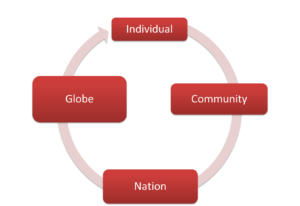Experiences from previous pandemics have shown that, when such outbreaks evolve, there is an urgent need to expand public health activities beyond urgent clinical management. Also, the 2020 pandemic ‘COVID-19 outbreak’ is not an exception!
This pandemic has brought a new set of challenges for the individual to maintain a healthy mind and
body. In the starting phase, many of the countries have announced lockdown around the globe.
Citizens were asked to stay at home for the community spread of virus. These measures of social
distancing have severe repercussions on both Physical as well as Mental well-being.
If we look at physical health, the food and health nutrients supply chain was hampered due to
insufficient transportation. Even, the confinement to home has directly affected one’s physically
working patterns and eating habits. For working class people, adapting to ‘Work from Home’ norms
brought very low energy expenditure.
Even COVID-19 has implications on mental health. It has been seen, fear and anxiety about this
pandemic has changed diet pattern around the globe. Compelling evidence showed that dietary
habits are affected by conditions of stress, distress, and emotional disturbance, whereby elevated
distress levels are associated with unhealthy dietary patterns and poor quality of the diet.
Malnutrition: The silent pandemic in India
Global Hunger Index has shown India is a home for about 30% of world’s stunted children and 50%
of severely wasted children. In addition to this, other factors like anaemia and obesity are increasing
burden on hidden huger.
The recent pandemic has brought serious threats to nutritional rights of malnourished individuals.
The lockdown has disrupted access to essential services including mid-day meals, vaccinations and
also supply of health supplements to the needy.
Mitigating COVID-19 impact:
To fight against upcoming pandemic of Malnutrition, one needs to tackle of four levels; individual,
community, national and global.
Individual stance:
At individual level, the responsibility lies in making an effort to choose a healthy lifestyle with right
diet and exercise.
Community stance:
At community level, people should avoid stock buying. Those who can afford can stock extra food or
other essential materials, which increases stress on supply chain. Therefore, at a community level, it
is crucial to spread awareness against ‘Panic-buy’.

National Stance:
All nations around the globe are experiencing burden on healthcare services so national economy as
well. To avoid the shortage of essential services including foods and medicines, government should
invest in planning of resources, formulation of policies to support the production and distribution.
Even the public private partnership has become imperative to build etweorks with private sector,
the international agencies, and local communities. Even as social level, running public awareness
campaigns, nutrition education, emergency news bulletins, radio and TV announcements can create
awareness.
Global Stance:
COVID-19 has shown a global threat requires global action. There is a need to work together and
coordination among countries to ensure supply of essential goods and medicines and making sure
that humanity emerges from this pandemic with the least possible losses.
In nutshell, when entire world is engaged in vaccine research, the influence of this pandemic on
nutrition and dietary intake has already gone beyond the individual and the community to reach
national and global levels. The main aim should be to maintain the physical and mental well-being
individuals with resilience of communities, and national and global food security.
Sources:
https://www.nature.com/articles/s41430-020-0634-3
https://indianexpress.com/article/opinion/malnutrition-the-silent-pandemic-6610858/
